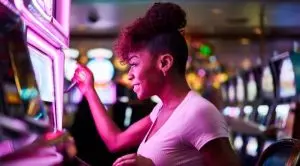 New research held by GambleAware showed that female gambling addicts in the UK are more likely to be young, from a BAME (“black, Asian or minority ethnic”) background and working class.
New research held by GambleAware showed that female gambling addicts in the UK are more likely to be young, from a BAME (“black, Asian or minority ethnic”) background and working class.
A couple of days ago, the largest problem gambling charity in the UK – GambleAware – issued a report that was compiled from YouGov that was aimed at checking the experiences of women and gambling. A total of 6,190 female and 5,971 male residents of the UK took part in the three-week survey in the autumn of 2019 to determine their ranking on the Problem Gambling Severity Index (PGSI).
As part of the research, each individual that took part in the survey was assigned a PGSI score. A 0 score indicated that the person’s gambling does not present any problems, a 1-2 score is considered low-risk gambling problems, while a 3-7 PGSI score indicates a moderate risk of problem gambling behaviour. Individuals who had a score of 8 and above were found to be experiencing serious gambling addiction.
According to figures revealed by the new research, 20% of female gamblers in the UK who had a PGSI score of 1 and above, while 35% of female gamblers who had a PGSI score of 8 and above are from a BAME background, in comparison to 12% of the overall female population. Interestingly, the same pattern is also present amongst male gamblers – 12% of men who had a PGSI score of 8 and above originate from a BAME background, comparison to 12% of the overall male population.
Female Problem Gamblers More Likely Not to Receive Help Due to Perceived Stigma
 According to the survey findings, female problem gamblers with a PGSI score of 8 and above are more likely to identify as also being an “affected other” – a person who experiences harm as a result of another person’s gambling. Approximately 19% of them were identified as such, in comparison to 8% of women overall. As researchers found, 16% of these women came from a BAME background, and such women are more negatively affected by the gambling of a close family member than men.
According to the survey findings, female problem gamblers with a PGSI score of 8 and above are more likely to identify as also being an “affected other” – a person who experiences harm as a result of another person’s gambling. Approximately 19% of them were identified as such, in comparison to 8% of women overall. As researchers found, 16% of these women came from a BAME background, and such women are more negatively affected by the gambling of a close family member than men.
Researchers also found that 39% of the female gamblers who were unwilling to get advice, treatment or any other support for their gambling said their refusal was fuelled by a perceived stigma, such as feeling ashamed or embarrassed. A total of 39% of female gambling addicts shared that the key barrier for not accessing professional treatment of their compulsive gambling is feeling embarrassed by it or not wanting people to find out about their gambling. In comparison, only 22% of male problem gamblers shared the same.
However, female problem gamblers from BAME background were more willing to seek out special treatment programs than white women. Furthermore, younger women of all backgrounds were more likely to look for professional help to deal with their compulsive gambling than older women.
- Author


